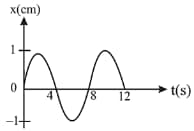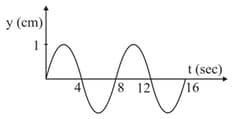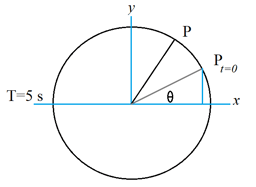Equation of SHM
Equation of SHM: Overview
This topic covers concepts such as Equation of SHM, Position-Time Graph in SHM, Phase Difference in SHM, Condition for Two SHMs to Be in Same Phase, Condition for Two SHMs to Be in Opposite Phase, etc.
Important Questions on Equation of SHM
The graph of a particle undergoing simple harmonic motion is as shown in the figure.

The acceleration of the particle at is
Which one of the following expressions does not represent simple harmonic motion (SMH)?
The phase difference between the displacement and velocity of a particle executing simple harmonic motion is
What will be the initial phase of simple harmonic motion represented by the equation .
If two SHMs of different amplitudes are added together, the resultant SHM will be a maximum if the phase difference between them is:
Two particles execute simple harmonic motions of same amplitude and frequency along the same straight line. They cross one another when going opposite directions. The phase difference between them when their displacements are one half of their amplitudes is then:
Graph between velocity and displacement of a particle, executing S.H.M. is
Initial phase of the particle executing SHM with is:
When two particles executing SHM are overlapped in opposite phase then resultant amplitude will be
The displacement of two particles executing SHM are expressed as and then at both are
Two simple harmonic motions have displacements and are superimposed on each other. Resulting amplitude will be.
Two SHM’s are respectively by and The phase difference between the two is
The figure below shows the displacement vs time plot of a particle undergoing simple harmonic motion. The acceleration of the particle at time sec would be

Suppose a particle P is moving uniformly on a circle of radius A with the angular speed . The sense of rotation is anticlockwise. If the , it makes an angle of with the positive direction of the x-axis. In time , it will cover a further angle .What is the projection of position vector on the X-axis at time .
If we tie a stone to the end of a string and move it with a constant angular speed in a horizontal plane about fixed point, the stone would perform a :
If the particle is moving in circular motion under SHM, then its x-projection is depending upon
The x-projection for a certain particle in circular motion under SHM with period of , amplitude of oscillation is and initial phase of is
The x-projection of the particle in circular motion under SHM is independent of initial phase of the particle.
If a particle is in circular motion is under SHM moving to and fro about x-axis with period of and its initial angle made with horizontal axis is then find the projection of the particle after time if the amplitude of the particle under SHM is .
In the figure given below the period of revolution, the initial position and the sense of revolution are indicated. Obtain the simple harmonic motions of the x-projection of the radius vector of the rotating particle P if the given figure depicts circular motion. (Here, )

